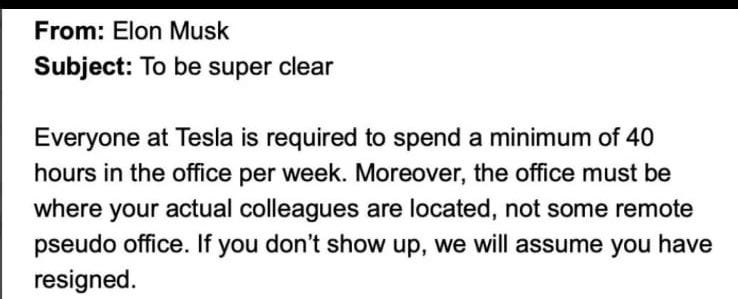Hybrid working - just slacking off?
It's either the new utopia, or the end of productivity - you decide
You probably saw that message from Elon, in which he made it ‘super clear’ that his staff were not to be ‘phoning it in’ by working anywhere other than their main office location. It’s still doing the rounds (I was forwarded it again last week).
It seems to have been another blow to the shifts in working life that many people were forced into during Covid and which are either here to stay, or an annoying distraction, depending on where you work.
The reaction online was predictable – a fairly even split between workers trumpeting their rights to a work-life balance, countered by corporate types (and normal people too) lamenting the death of the office environment. And as ever, those two main viewpoints are pushed further and further to the extreme as the discussion/argument continues.
Those seeking a good balance are soft and entitled, and have never done a day’s work in their lives. Those campaigning for a full week in the office are tyrants, advocates of presenteeism rather than results, dinosaurs harking back to an age when your worth was judged by the number of hours you spent in the office.
And they’re both completely missing the point.
It’s not asking the real question, nor solving the real problem. There is no single right answer when it comes to remote working (working somewhere other than your organisation’s main location) or hybrid working (working in a variety of ways or from a variety of places).
If you’re debating the merits of hybrid working, ask yourself what problem it is that you’re really trying to solve. And if you’re a boss, wondering what policy or allowances you should have in place for your team or organisation, then you need to break it down to the real question and the real issue, and start there.
If you are running a team, that can be done from a variety of places, but you need to work closely with your team if you are gong to manage them properly. And that’s harder working remotely, which means you need to work harder to stay in touch.
So the question should be ‘how are you going to make sure that your team are well-managed?’
If your job involves dealing with customers or clients, that can be in person or remotely. It will probably be more effective done in person, particularly if it is a new contact or one that’s still developing, but if it’s a well-established relationship then there should be no reason why that can’t be run remotely, at least some of the time.
So if one of your people needs to deal with clients, ask them how they plan to do that, in detail.
If you don’t trust your staff to work remotely at all, then that is either a failure in your leadership or how your organisation is run.
If you are certain that your staff are lazy and or fraudulent and can only work effectively under your direct and constant supervision, then you are the problem.
Lead better. Be clear about the direction and what good looks like, then talk to your people about how they can best get the job done.
If you believe that a blanket rule (like Elon’s minimum 40 hours in the office and no ‘phoning it in’) is the only way to apply fairness, then you’re applying the fairness to the wrong thing. Fairness is giving everyone the right to an open, two-way discussion about how they can best get the job done. The solution doesn’t have to be the same for everyone, as long as they have an equal opportunity to shape it.
It’s the basic difference between equality and equity.
Microsoft, for their part, seem to be holding the line in their policy that some remote working is still okay, although I’m told it’s not always working out that way in practice.
“Most employees are expected to spend around 50% of their time in the office, although this can vary depending on the nature of the job and local team agreements…”
A friend of mine in the public sector in the UK tells me that hybrid working has very much stuck, in spite of occasional calls from the previous Government to get people back to their desks.
Of course this won’t apply to every line of work. If your job is to physically assemble things, you’re probably not going to be able to phone that in. if you have to drive people or things to places, or if you are a landscape gardener or roofer, then again, that’s probably best done in person.
But then you’re not stuck in the office to begin with.
Remote dentistry hasn’t really caught on, in spite of my local dentist’s best efforts to prevent me getting in there. But then spending all day on video calls would have seemed impossible twenty years ago, so who knows what’s coming?
I generally prefer to be in an office if I’m in a ‘normal’ job. That’s as much about the environment as about the people. If I am in a place that solely exists for work then I get more done, and I’m less likely to be distracted. I much prefer in person meetings to video calls.
My wife is the exact opposite – she finds the office distracting and noisy, and gets far more done at home, where she can control (to an extent) the interactions and where and when they happen.
At the same time, I find myself bemused by the whole debate about remote and hybrid working.
I’ve definitely seen an increase in people that want to spend at least some of their time working away from the office (often from home). I’ve also seen a definite increase in the base level of entitlement shown by newer recruits into working life. But neither of those things are resolved, or managed, by applying arbitrary rules to everyone.
Remote working is neither good nor bad. It presents an opportunity, and it has a place. But some things are better done in person. It’s a question of getting the right balance, for individuals, for teams and for the organisation as a whole. It’s about how to get the job done, sustainably and as well as possible. It’s not about what you’re entitled to, nor an arbitrary amount of hours per week, applied to everyone.
Miserable workers are not effective workers, whether they are a creative, a salesperson, a coder or a manager. If someone is spending a day a week at home, and it’s making them happier, they are probably getting more done. And if you’re concerned that that is not the case, focus on the results and why that is not happening, rather than assuming that the problem is the fact of being at home.
If someone in my team said they wanted to work 100% remotely, I would be sceptical of that. I would want to understand why, and how they saw themselves getting the job done that way, and how they would maintain good enough contact with everyone else they needed to.
I would expect them to be equally sceptical if I said that it was not possible to do any of their work remotely – that can’t possibly be the case in a connected world. Let the work drive how and where it’s done. Arbitrary rules aren’t helpful.
Teamwork and productivity are based on trust, collaboration, engagement. Management is based on great personal relationships. So if you’re that boss, you need to be present enough to be able to build and maintain those relationships. But a boss sat ten yards away who only speaks when giving an order, is worse than one who checks in remotely, with care, three times a day.
And if you are that boss, and you’re focussing too much on the ‘how’ of the work, not the ‘what’ or the ‘why’, then you are micromanaging. Give your team the space they need to get the work done, and let them tell you how best they can do it.
Don’t be that boss.








